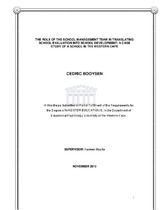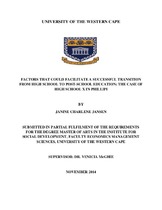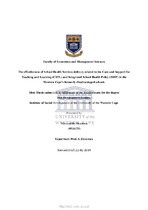| dc.contributor.advisor | Lazarus, S. | |
| dc.contributor.author | Maharaj, A. | |
| dc.date.accessioned | 2022-01-17T08:09:42Z | |
| dc.date.available | 2022-01-17T08:09:42Z | |
| dc.date.issued | 2005 | |
| dc.identifier.uri | http://hdl.handle.net/11394/8598 | |
| dc.description | Philosophiae Doctor - PhD | en_US |
| dc.description.abstract | This study was initiated while the researcher was still an educator at' a secondary school in Cape' Town, South Africa. This was the period of the mid-1990s soon after the first democratically elected government assumed power in -South Africa: During this period of transition, large-scale reforms were expected on', the, education- front. Educational management and specifically school management were an integral part of these reforms. In terms of school management the idea of parents taking. on a greater .role was receiving wide support. School governing bodies (SGBs) comprising various constituencies and with greater powers were supposed to be the instrument spearheading change in school
management. .This study traverses three levels of policy development: national, provincial and local (that is, school). It seeks to understand how school governance policy is developed and implemented using the principle of contestation to guide the analysis. The following questions guided the research: What were the contestations which led to the development of school governance policy at national level? How was provincial school governance policy developed from national policy and what were the areas of contention between the two?
• What were the contestations resulting from implementation of school governance policy at the school level? At all three levels the discussion of the contestations was limited to the powers and functions of SGBs. By shedding more light on the above questions, it was hoped that the nature of policy contestation would become clearer. This in turn could enhance the study of policy This study was primarily qualitative in orientation with the principal means of data-gathering being: documentary analysis, semi-structured interviews and observation. Documents produced at the national and provincial levels (Acts, Bills, Reports, White Papers and so forth) as well as submissions made by various organizations from different sectors in society were carefully analysed using specific criteria. Other documents analysed included circulars from the provincial education department, documents discussed Within the school governing body selected for the study, and articles from newspaper publications. Interviews were conducted with key informants at national, provincial and school levels. At the school level, observation of five governing body meetings were undertaken analysis and development. This study revealed that the key issues in SGB functioning that formed the focus for contestation were: the charging of school fees; the':·employment of additional staff;
admission-; language-; religious observance policy;". and relative powers of the MEe/HOD/SGBs. One of the greatest immediate challenges facing the majority of school governing bodies in South Africa is the lack of capacity in terms of material, financial and human resources. This
study provides recommendations about how to address some of these challenges, and also identifies some important areas for future research. | en_US |
| dc.language.iso | en | en_US |
| dc.publisher | University of the Western Cape | en_US |
| dc.subject | School governing bodies (SGB) | en_US |
| dc.subject | Cape Town | en_US |
| dc.subject | South African Schools Act (SASA) | en_US |
| dc.subject | South African Schools Bill | en_US |
| dc.subject | White Papers | en_US |
| dc.subject | Parent- Teacher- Student-Association (PTSA) | en_US |
| dc.subject | School Management Councils | en_US |
| dc.subject | Local Education Authorities (LEA) | en_US |
| dc.title | The development and implementation of school governance policy in South African schools act (SASA) and the Western Cape provincial school education act (WCPSA) | en_US |
| dc.rights.holder | University of the Western Cape | en_US |




